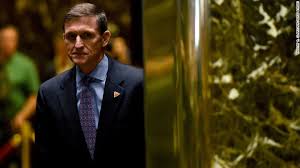3 military figures top list to replace Flynn
Thu 16 Feb 2017, 00:01:09

WASHINGTON: Retired Gen. Michael Flynn’s resignation Monday night, after only 24 days in office as national security adviser (NSA), has jarred the Donald Trump administration, adding to existing turmoil over appointments and strategy for the 45th US president.
The resignation over secret contacts that Flynn had with Russian officials was not entirely a surprise, after weeks of leaks and discrepancies in his statements about the calls he made to them.
The smoking gun appears to have been Flynn’s call to Russian Ambassador Serge Kislyak on Dec. 29 in which, according to US officials quoted in the Washington Post and New York Times, they discussed easing new sanctions on Russia, which is considered illegal since Flynn was not yet an authorized official.
What quickened his downfall was misleading his superior, Vice President Mike Pence, over the Kislyak call, prompting an inaccurate defense of Flynn by Pence on public television on Jan. 15.
While Flynn could face a Congressional investigation into his behavior and possible violation of the Logan Act for breaking the law forbidding unauthorized individuals from negotiating with foreign governments over conflicts, he is unlikely to face imminent legal action.
His resignation, however, has shaken an already fragile Trump White House, with increasing chatter of more resignations to come of officials who were brought on by Flynn.
According to the New York Times, they could include his deputy K.T. McFarland, Dave Horan or Robin Townley, whose security clearance was blocked by US intelligence last week.
Sources told Arab News that Flynn was seen as “insecure and confrontational” inside the White House.
The Washington Post reported him having no friends to defend him after alienating Pence, being disliked by chief strategist Steve Bannon, and having a tense history with both the intelligence community and Defense Secretary James Mattis.
While the White House and Republican leaders reaffirmed Trump’s decision to let go of Flynn following an “evolving and eroding level of trust,” according to spokesperson Sean Spicer, there is an effort to move swiftly in finding a replacement and restructuring the team and National Security Council (NSC) strategy.
US media — including CNN, NBC and CBS — have
focused on three potential names who are in the running to replace Flynn: Retired Gen. Joseph Keith Kellogg Jr., who has been named acting NSA and is a close ally of Flynn; former CIA Director Gen. David Petraeus, who met with Trump yesterday; and Vice Admiral Robert Harward, a retired Navy SEAL and former deputy commander of Central Command.
focused on three potential names who are in the running to replace Flynn: Retired Gen. Joseph Keith Kellogg Jr., who has been named acting NSA and is a close ally of Flynn; former CIA Director Gen. David Petraeus, who met with Trump yesterday; and Vice Admiral Robert Harward, a retired Navy SEAL and former deputy commander of Central Command.
White House adviser Kellyanne Conway confirmed to NBC that there are “three candidates, very strong candidates that will be considered for a permanent position here.” Harward is considered the frontrunner because of his good connections to the military and very close relation with Mattis, whom Trump has grown to respect and listen to.
Harward was born into a Navy family. He lived in Iran and graduated from the Tehran American School in 1974, five years before the Islamic Revolution. He worked as an executive for Lockheed Martin in the United Arab Emirates (UAE), and is known for his direct, no-nonsense military approach. What could also work in his favor is that Kellogg, 72, is seen as too old for the tedious job of NSA and too close to Flynn.
Petraeus’ legal woes could overshadow his appointment after having pleaded guilty to a disclosure of classified information to his biographer Paula Broadwell in 2012. Yet Petraeus’ good chemistry with Trump, and his vast experience in the Middle East, could make the US president overlook the scandal.
On the Middle East particularly, Flynn’s resignation will hurt outreach to Russia in coordinating the fight against Daesh in Syria, since the former NSA was the main interlocutor with Moscow on the issue. It is also seen as bad news for Ankara, since Flynn had advocated extraditing opposition figure Fethullah Gulen to Turkey.
It is unclear if Flynn’s resignation will affect the strategy on Iran, especially since it was he who put Tehran “on notice” after its ballistic missile test on Jan. 29. Sources close to the administration told Arab News there is an overarching consensus among the defense, state and intelligence departments in countering Iran regionally, a view Flynn shared.
For now, all eyes will be on his replacement, and Trump’s roadmap to force some balance and stability into his tenure after what has been by all measures a rocky start for the new administration.
No Comments For This Post, Be first to write a Comment.
Most viewed from International
Most viewed from World
AIMIM News
Latest Urdu News
Most Viewed
May 26, 2020
Do you think Canada-India relations will improve under New PM Mark Carney?
Latest Videos View All
Like Us
Home
About Us
Advertise With Us
All Polls
Epaper Archives
Privacy Policy
Contact Us
Download Etemaad App
© 2025 Etemaad Daily News, All Rights Reserved.



.jpg)






.jpg)
.jpg)








.jpg)
.jpg)
.jpg)
.jpg)
.jpg)

















